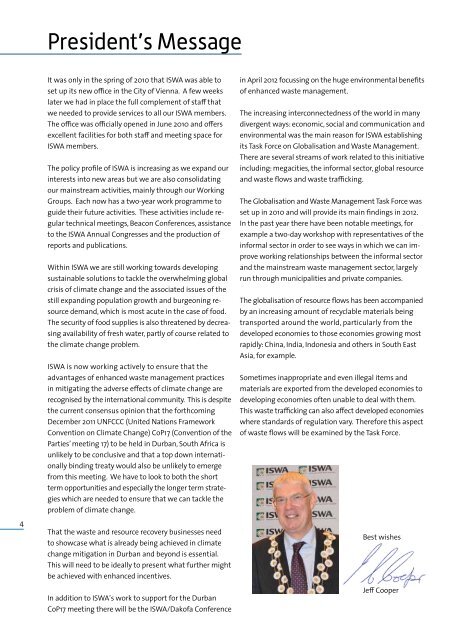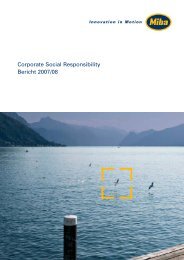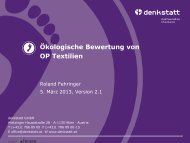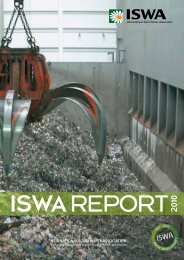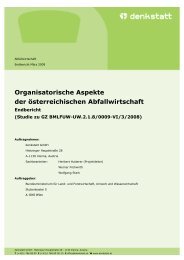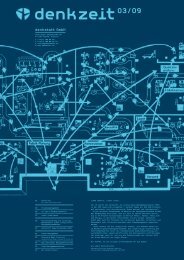INTERNATIONAL SOLID WASTE ASSOCIATION - Denkstatt
INTERNATIONAL SOLID WASTE ASSOCIATION - Denkstatt
INTERNATIONAL SOLID WASTE ASSOCIATION - Denkstatt
You also want an ePaper? Increase the reach of your titles
YUMPU automatically turns print PDFs into web optimized ePapers that Google loves.
President’s Message<br />
4<br />
It was only in the spring of 2010 that ISWA was able to<br />
set up its new office in the City of Vienna. A few weeks<br />
later we had in place the full complement of staff that<br />
we needed to provide services to all our ISWA members.<br />
The office was officially opened in June 2010 and offers<br />
excellent facilities for both staff and meeting space for<br />
ISWA members.<br />
The policy profile of ISWA is increasing as we expand our<br />
interests into new areas but we are also consolidating<br />
our mainstream activities, mainly through our Working<br />
Groups. Each now has a two-year work programme to<br />
guide their future activities. These activities include regular<br />
technical meetings, Beacon Conferences, assistance<br />
to the ISWA Annual Congresses and the production of<br />
reports and publications.<br />
Within ISWA we are still working towards developing<br />
sustainable solutions to tackle the overwhelming global<br />
crisis of climate change and the associated issues of the<br />
still expanding population growth and burgeoning resource<br />
demand, which is most acute in the case of food.<br />
The security of food supplies is also threatened by decreasing<br />
availability of fresh water, partly of course related to<br />
the climate change problem.<br />
ISWA is now working actively to ensure that the<br />
advantages of enhanced waste management practices<br />
in mitigating the adverse effects of climate change are<br />
recognised by the international community. This is despite<br />
the current consensus opinion that the forthcoming<br />
December 2011 UNFCCC (United Nations Framework<br />
Convention on Climate Change) CoP17 (Convention of the<br />
Parties’ meeting 17) to be held in Durban, South Africa is<br />
unlikely to be conclusive and that a top down internationally<br />
binding treaty would also be unlikely to emerge<br />
from this meeting. We have to look to both the short<br />
term opportunities and especially the longer term strategies<br />
which are needed to ensure that we can tackle the<br />
problem of climate change.<br />
That the waste and resource recovery businesses need<br />
to showcase what is already being achieved in climate<br />
change mitigation in Durban and beyond is essential.<br />
This will need to be ideally to present what further might<br />
be achieved with enhanced incentives.<br />
In addition to ISWA’s work to support for the Durban<br />
CoP17 meeting there will be the ISWA/Dakofa Conference<br />
in April 2012 focussing on the huge environmental benefits<br />
of enhanced waste management.<br />
The increasing interconnectedness of the world in many<br />
divergent ways: economic, social and communication and<br />
environmental was the main reason for ISWA establishing<br />
its Task Force on Globalisation and Waste Management.<br />
There are several streams of work related to this initiative<br />
including: megacities, the informal sector, global resource<br />
and waste flows and waste trafficking.<br />
The Globalisation and Waste Management Task Force was<br />
set up in 2010 and will provide its main findings in 2012.<br />
In the past year there have been notable meetings, for<br />
example a two-day workshop with representatives of the<br />
informal sector in order to see ways in which we can improve<br />
working relationships between the informal sector<br />
and the mainstream waste management sector, largely<br />
run through municipalities and private companies.<br />
The globalisation of resource flows has been accompanied<br />
by an increasing amount of recyclable materials being<br />
transported around the world, particularly from the<br />
developed economies to those economies growing most<br />
rapidly: China, India, Indonesia and others in South East<br />
Asia, for example.<br />
Sometimes inappropriate and even illegal items and<br />
materials are exported from the developed economies to<br />
developing economies often unable to deal with them.<br />
This waste trafficking can also affect developed economies<br />
where standards of regulation vary. Therefore this aspect<br />
of waste flows will be examined by the Task Force.<br />
Best wishes<br />
Jeff Cooper


